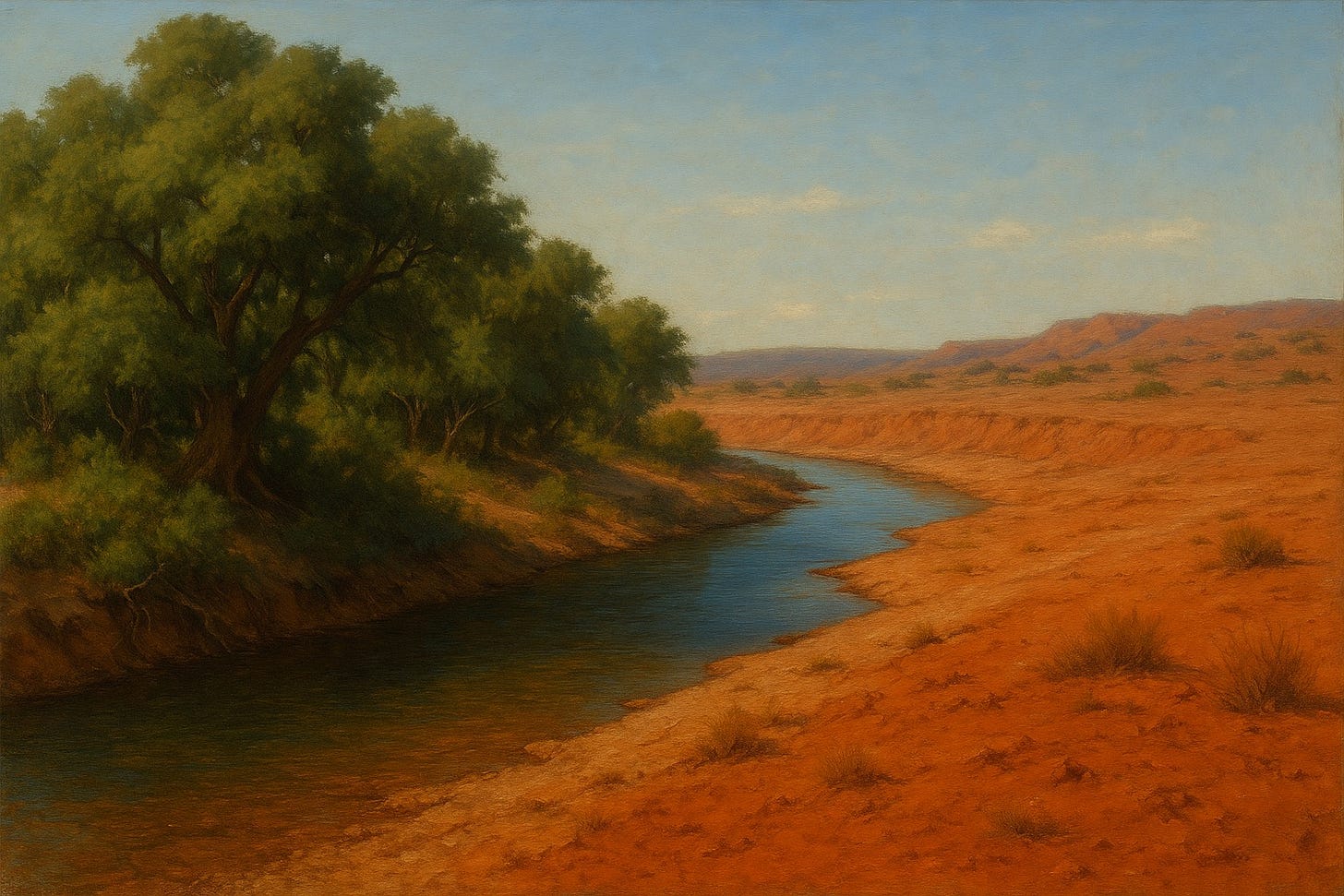Finding Grace
The sun spins in a quiet arm of the Milky Way, far enough from the rapacious middle for its planets to flourish. The earth bisects the habitable part of its ecliptic, safe from the cold and ice that vex eccentric orbits. On the cusp of North Texas, the Concha River cuts a furlong-wide thread of life through plains baked by sun, flogged by wind, and forsaken by rain.
The place Patty and Julie found was an experiment. A dozen decades ago, a Yankee philanthropist sought grace by planting trees on the plains. The trees were hauled up from Tyler on the railroad, swaddled in hand-dug holes, and fertilized every spring for six years. Most withered and died. But the ones that burrowed beneath the banks of the Concha, the ones that drank its bounty, the ones that mastered gravity and location, lived and grew.
The luckiest and lushest stand crowned a quarter section a hard-drinking rancher won in a poker game in the 1920s. He built a lean-to in an arbor the sun seldom scorched. When he died in 1953, an oilman built a stone house beneath the boughs and within smell of the river. Even in August, the shade and ceiling fans made the heat livable—if you went in the plunge pool once an hour. Air conditioning made things better.
Patty admired this house dozens of times driving to and from San Angelo State. When Phil agreed to give her forty percent of the dealership and four hundred thousand dollars in cash, she bought it. Patty tended a garden that bloomed amid her love, Phil’s money, and commercial-grade pipes. Julie raised sheep. Their grain came from combines, their milk from chaste cows, and their power from dividends.
In summer, Patty would wade into the Concha to gather fresh mussels. She liked the silt between her toes, the water that barely touched her thighs, and Julie’s hand on her back when she rose, sparkling from the water. They both wanted a baby. Julie didn’t want to be pregnant. Patty thought adoption was more Christian than in vitro, and smirked at two lesbians raising the fruit of a horny doctor’s affair.
When a friend’s younger sister got pregnant, Patty and Julie invited her to stay. The girl did her penance beneath the oaks, delivered a beautiful eight-pound boy, then decamped for faster times. She could always visit the baby when she was sober, and signed the adoption papers more happy than sad.
The boy grew beneath the trembling oaks. He took his first steps on the cedar floorboards and threw stones into the river’s calm. He liked how the river healed itself with every stone. At three, he chased squirrels; at five, he demanded a toy gun. His teachers liked him, but the other boys didn’t. He didn’t know what irked them—his long hair, his mother’s NPR sticker, or the fact she wasn’t his only mom. Patty told him kindness was armor. Phil taught him the uppercut.
Twice a month, Phil drove over with his daughters and spreadsheets from the dealership. They had a general manager back in Lubbock but still liked to pretend they were running things. Annabell always brought her iPad. Phil said it helped the adults focus on business. Lydia played with Julie and the sheep. Annabell and the boy would huddle on the porch swing and watch videos—first old Mr. Beast clips, then drone races up the shafts of empty office towers, and, when they were thirteen, a sensitive documentary about Annabell’s dad. At fourteen, they went on walks, and no one tried too hard to find them.
Phil Mason, whose young wife calmed him, exceeded him, and would never give him a third child or a first son, knew an opportunity. In the fall of 2040, Phil and the young man drove down from the Concha, through the dust and mesquite along the upper Colorado to the hills west of Austin. They bagged two deer. Patty was fine with hunting but drew the line at taxidermy.
The political conditions were more fertile than the First French Republic, Periclean Athens, or Chicago. The guillotine claimed a few dozen wretches a year, and, by the boy’s fifth birthday, Texas was safer than Europe. The executions now brought more sorrow than spectacle, but few insisted they stop. Oklahoma adopted a Whole Head Guillotine the year after Texas, Mississippi and Utah the year after that. Klein and Yglesias debated whether guillotine abundance would win Democrats the moderate vote. Then the dam broke, and Texas-style guillotines spread like dispensaries. Vermont and Massachusetts held out. They had been safe since the reign of Victoria—safe enough to hate slavery and electric chairs and AR-47s, safe without smashing heads. New York rejoined red America. Massachusetts, newly estranged from its former colonies, flirted with the King of Canada and the EU. Le Pen rode the guillotine to the Élysée Palace. The European Court of Human Rights sharpened its pens.


